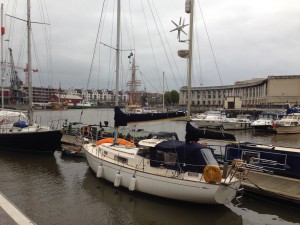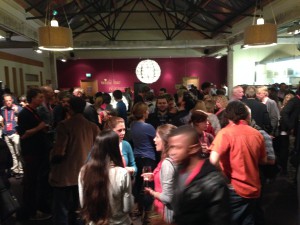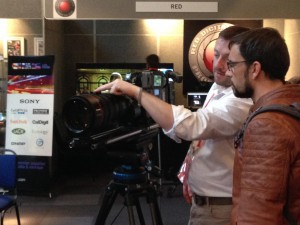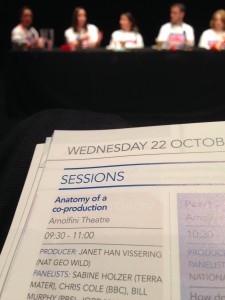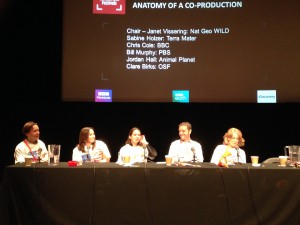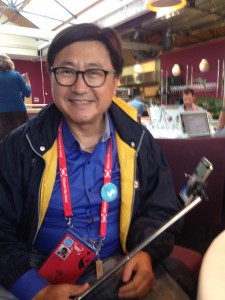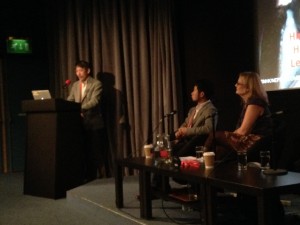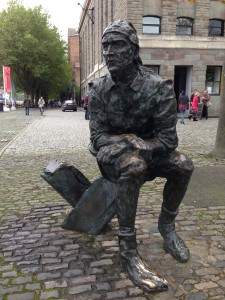Wildscreen is a conference and gathering held in Bristol for nature and wildlife filmmakers, distributors, and broadcasters. It happens once every two years, alternating with the Jackson Hole festival in Wyoming. Everybody clusters around Bristol’s lovely harbourside, like animals around a waterhole, wandering between the Arnolfini Gallery, Bordeaux Quay, and the Watershed centre.
It’s relaxed, chatty, and dressed-down.
Nearly 30% of the world’s wildlife programmes are made by Bristol-based companies or crew. The BBC Natural History Unit was founded here over 50 years ago, and provided a foundation for the sector. Now October every two years is the place to be to watch, discuss and celebrate the genre. It has its Panda Awards, given out on the last night – and you can see the results here. Wildscreen feels very different from the business-driven ‘industry’ events like Realscreen, the Broadcast conferences, or Sunny Side. There are sponsors of course, but it’s all low-key. Like the World Congress of Science Producers, Wildscreen feels run by the community for the community.
After I left for dinner on Wednesday I’d like to think the crowd at Bordeaux Quay would have got down grooving to this little number:
There’s a strong production aspect to Wildscreen – about actually making films as well as financing them. There was much talk about the need to innovate in camera techniques to boost declining audiences. Camera manufacturers and rental companies had their own room to show off their kit, usually with seriously long lenses attached. 4K is now standard for filming wildlife.
Janet Han Vissering of Nat Geo Wild handed out lots of chocolates, and got the members of her panel on coproduction, the first of the day, to wear T-shirts with flags of the countries they were from. Everybody on the panel knew and had worked with each other. Janet’s metaphor for coproduction was a holiday with a friend, and she entertainingly got audience members to talk about the pitfalls of such holidays. All the panellists looked as if they’d be pretty good holiday company.
Partnerships across borders are now essential in factual programmes. Hence the very international feel of the market. I met Germans, French, Austrians, Australians, Irish, Americans, Canadians. Kenny Bae from Korea was there with his hi-tech selfie-taker
Hiromichi Iwasaki of NHK in Japan told us about their very big budget Giant Squid documentary from earlier this year. The production used a boat costing $50,000 a day, for 60 days, to try and catch the first images of the squid. $3 million just for the boat, with the rest of the cost of making the film on top. (Though that $3 million did apparently include the submersibles).
The US producer on this coproduction (on the right in the picture above) told the audience that having invested in the huge cost of the expedition, Discovery said that they wanted a ‘monster‘ film, not an expedition one, as ‘monsters were hot right now’. They needed quite a bit of persuading to keep the expedition aspects in, apparently.
I’ve been making it my business to work in the coproduction area over the past three years. That’s been with the Sunny Side and Asian Side of the Doc markets, helping the international development of Gedeon, and now consulting for SBS in Australia. Wildlife is a very international genre, but because of that – and the fact it often doesn’t date – supply outstrips demand. And the audience is always asking for something newer and different, particularly in Australia where both the ABC and the commercial channels show the cream of natural history filmmaking. I’m realising I need to ‘think different’ and find more partnerships with broadcasters – and not just the usual suspects – to secure the impactful shows that we want to bring the SBS audience. I’d love to hear and talk about ideas along those lines you might have.
Suzanne Harle from distributor Green Planet Films, seeing that I represented SBS, told me of when she was a student in the early days of SBS, where it was associated with programmes about drugs, peace and love. Apparently in those days the student audience watching it was mostly stoned, and SBS stood not for Special Broadcasting Service but for the Special Bong Station. I will look that when I go to Sydney in December…

